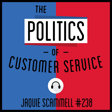Become a Creator today!Start creating today - Share your story with the world!
Start for free
00:00:00
00:00:01

240: The Politics of Overcoming Business Failure - Jim Cocks
Failure is part of life. It can hit harder – more publicly perhaps- when it comes to your business as well. Here with me is Jim Cocks, who is a respected Australian business coach with a passion for helping entrepreneurs grow and scale faster. Following a ‘quarter-life crisis’, he discovered his love for coaching and became an ICF-accredited coach and trainer. He has worked with thousands of entrepreneurs to help them build freedom-based businesses and offers a tailored coaching pathway to help coaches and other experts grow their businesses online. Entrepreneur Jim Cocks also experienced challenges and burnt out. After hitting rock bottom in his twenties Jim dropped out of the rat-race to find a better path - one with more freedom, wealth, and fulfillment. In his new book, Build Excite Ignite (Dean Publishing $27.90), Jim unpacks his knowledge to provide a practical and personalised coaching guide for those looking to break free
We hear from Jim on:
· The 9-5 is dead already isn’t it after Covid and the normalisation of flex work arrangements in many sectors. Will this remain the case in the years ahead or is that something only entrepreneurs can embrace for the longer term?
· Has hustle culture now become old news and will burnout become also a thing we reject to succeed in business? Explain your experience.
· How can you best bounce back from a business failure?
· Is the idea of using mindset techniques to tackle life with a “winner’s mentality” something new or have you seen it work for many years in different ways perhaps because certain people have that in their DNA? I am thinking of athletes or even business leaders like Steve Jobs who failed and came back. Surely they didn’t have coaches to do this every time.
Connect further:
LinkedIn: https://www.linkedin.com/in/coachjimcocks
Instagram: https://www.instagram.com/coachjimcocks/
Transcript
Introduction to 'The Politics of Everything'
00:00:02
Speaker
Welcome to the politics of everything. I'm Amber Danes, your host and podcast producer. This is a half hour of power podcast dropping every week where I unpack the politics of everything from money to motherhood, nutrition to narcissism, startups to secularism, the environment, quality and much, much more.
00:00:22
Speaker
Our guests are seasoned in the field of topic of their choice, even if you've not heard of them yet. This is a nonpartisan show. So while I love exploring varied views and get a buzz from a healthy debate of ideas, this is not a purely blue, white, green program. Please subscribe, tune in and enjoy the politics of everything.
Jim Cox's Journey to Entrepreneur Coaching
00:00:46
Speaker
Failure is part of life. It can hit harder, maybe more publicly perhaps, when it comes to your business as well. Here with me is Jim Cox, who's a respected Australian business coach with a passion for helping entrepreneurs grow and scale faster. Following a quarter-life crisis, he discovered his love for coaching and became an ICF accredited coach and trainer. He's worked with thousands of entrepreneurs to help them build freedom-based businesses and offers a tailored coaching pathway to help coaches and other experts grow their businesses online.
00:01:13
Speaker
As an entrepreneur, he's also experienced challenges and burnout. After hitting rock bottom in his 20s, Jim dropped out of the rat race to find a better path, one with more freedom, wealth and fulfillment. And he has a book called Build Excite Ignite, love that title, where Jim unpacks his knowledge to provide a practical and personalized coaching guide for those looking to break free from nine to five jobs and create six-figure businesses. And I warmly welcome him to the politics of everything. Thank you for having me, Amber. Good to have you.
00:01:42
Speaker
Podcasting remotely can be challenging, but it doesn't have to be. Since day one of the politics of everything, I have relied on Zincasters all in one solution to make the process quick and painless, the way it should be for those of us who just love great content and want to get our ideas out into the world.
00:01:59
Speaker
If you know me, I'm obsessed with quality in terms of my guests, my sound, and everything about my show has to be great the first time. I'm Time Paul. It's so easy to use Zencaster. I'm not tech savvy and you don't need to be either. There's nothing to download. Just click on the link and off we go. Zencaster is all about making your podcasting experience easy and with everything from local recording to automated post-productions now in their toolkit,
00:02:24
Speaker
You don't have to leave your browser to get that episode done and done fast. I have a special offer for you and I hopefully you can experience what I have with Zencaster. Go to zencaster dot.com forward slash pricing and use my VIP code, the politics of everything, all lowercase in one word.
00:02:42
Speaker
to get 30% off your first three months of Zcaster Professional. How good is that? I want you to have the same easy experiences I do for all my podcasting and content needs. It's time to share your story. Hey Kay, young Jim, what did you want to be when you were maybe in your teens and and so forth and did that kind of eventuate? Because obviously you ended up in the rat race in your 20s.
00:03:04
Speaker
ah So I was incredibly antisocial as a kid. I was the the typical primary school geek and my mother decided to push me into ballet classes to help my social skills when I was about six. So the dream from very young on was to actually become a performer and I was very lucky that I i was able to live that life, travel the world, work for Disney.
00:03:27
Speaker
was an official Disney prince. So I did a whole bunch of things. Oh my goodness, this is like a dream. I know, right? I was I was actually literally living and in Disneyland for about three years in Tokyo and absolutely loved it. But I think what probably what hit me was that the transient lifestyle and you know wanting to put down roots and that good old Australian dream of of you know buying your own house and renovating it and doing all that fun stuff. So that's ah yeah, that's what led me to the corporate world.
00:03:54
Speaker
Amazing.
The Shift in Work Culture Post-COVID
00:03:55
Speaker
So we talk about this term of nine to five, which sort of feels a bit dead anyway, particularly after COVID, where the normalization of flexible and hybrid work arrangements has sort of permeated many sectors. There's a little bit of a swing back, obviously, in some corporates. But generally speaking, I ah don't know many people that do that nine to five and that traditional, you know, basic clocking in, sitting at your desk, looking at the clock to five, and then you can't leave until five. Do you think from your observations and the people you work with, this will remain the case in the years ahead?
00:04:23
Speaker
Or was it something that us entrepreneurs can really embrace longer term? Because let's face it, the reason we become entrepreneurs is largely for flexibility and freedom as well as all the other benefits. Correct. And I kind of wish that COVID had happened a couple of years earlier because then I probably wouldn't have gone through the torment that I went through in my in my corporate career. um But no, look, I think you've hit the nail on the head. I think that it's been fantastic to see um many corporates, especially those that are stuck in that sort of old school mentality of, you know, people don't work if they're not sitting at their desk nine to five.
00:04:53
Speaker
it's It's been great to open up the doors to people to have that sort of freedom-based lifestyle. Having said that, I think that there are definitely industries that will slowly creep back into that, especially with that millennial sort of mentality. I think that the people are finding, you know, people can be more productive in an office, which I think is why, you know, for for people like us, Amber, getting out and doing your own thing is probably one of the best things that you can do. Become your own boss.
00:05:18
Speaker
Absolutely. And I think it's interesting because the swing back has been sort of, I think took people by surprise and I see lots and lots of social media memes kind of playing that up. You know, they talk about in 2019 where like everyone was five days a week, perhaps, and flex work was only for a selected few by, you know, stealth negotiation with HR and then 2020 came and it was like, oh my God. I'm missing the office. I don't have my work from home set up. And then 2021, it was like, oh, this is great. I'm all set up. I'm never going back. And then suddenly it's like, it's either mandates or perhaps you've changed jobs and that's just not an option because you're new and it's hard to find your feet. I think, you know, in big organization, onboarding, things like that.
00:05:57
Speaker
It's been really interesting, though, to hear. And and I don't know from where, so please, whoever's listening, don't quote me. But there was
Balancing Work-Life and Overcoming Burnout
00:06:04
Speaker
a a study that was done recently where they surveyed a whole bunch of millennials around work-life balance. And something like 80% said that they would prefer to take a pay cut than not have that freedom-based lifestyle. So they yeah prefer to work in a job at a much lower rate than not have that flexibility.
00:06:25
Speaker
And my only disclaimer to that, cause I'm um' a bit older than that. I'm Gen X is like, I've lived through, I finished uni during a recession is yeah wait till a big recession comes and then you're begging for a job and then you don't, you know, you can't call the shots, you know what I mean? So it's just interesting. it's really justly from yeah yeah yeah Yeah, absolutely. I think also those terms, things like hustle culture to me has become old news. Like I find that notion of being always on as an entrepreneur, not appealing at all. Obviously, burnout is something you've dealt with, heaps of us have dealt with in different phases of our lives and stages of our careers. It's obviously something that a lot of us reject now in that past as success. Can you just explain your
Embracing Failure in Entrepreneurship
00:07:02
Speaker
own experience? And I guess without necessarily delving into all the personal side of things, when you when you did experience burnout, how you kind of got yourself together and recalibrated, if you like.
00:07:11
Speaker
Yeah, look, it it was it was that moment I actually watched a Mel Robbins YouTube video about the five second rule. So counting down five, four, three, two, one, and just getting up and getting things done. And that and that literally flipped me from from burnout being in bed for six months to starting up a business in my parents granny flat, which was, you know, kind of a a nice little pauper story. But, um, you know, I think Look, I think getting started with business can take a bit of hustle, but it's definitely not as prevalent as it used to be. You know, I'm sort of working three, maybe four days a week, you know, running ah a seven-figure business myself, and I've got an amazing team and make sure they have a flexible work-life balance as well. So I think if you're utilizing
00:07:55
Speaker
you know, technology and you're planning ahead and you've got the right strategy in place, that that freedom based lifestyle is definitely, yeah yeah, definitely easier to reach. Yeah, and it feels like it's more aspirational now as well. like It's that you don't have to be you know the work to live thing or live to work you a mantra. It's it's sort of really flipped. and I think most people would appreciate that. You used to be seen and I've sort of grown up in an era where I was very corporate culture and I worked as a journalist and that's a 24-7 job, but you know he didn't leave until the boss left physically from the news desk, even if you had nothing to do. like
00:08:29
Speaker
Exactly. Those days seem to be over, thank goodness, but then it's just that, okay, well, how do we actually have some discipline as well around our work? Because I must admit, I don't always work from home. I've got a remote team, but we come together and I do appreciate that as well, I think.
00:08:45
Speaker
you know it's not great to be in isolation all the time yeah i think it depends on how you operate like i'm i'm very similar to yourself and and i need that social interaction from time to time which is why you know i'm i'm talking to you from ah a college that i have a desk at because that's that's my sort of little touch point with a team and it definitely motivates me the interesting thing though i will admit i find i get less work done yeah and I'm spending more time being social and catching up with everybody because I haven't seen them for two
Developing a Winner's Mentality
00:09:13
Speaker
weeks. Whereas when I'm at home, I'm on an eight, I ah finished by three, but I get a ton of work done. So yeah, absolutely. Stealth mode. Exactly, exactly.
00:09:23
Speaker
How do you think people can bounce back from say a business failure because obviously the topic today is business failures. It is quite different to personal failures in a way. I mean obviously they can blend over and sometimes you have you know a whole bunch of things happen in your life which you know the business failure is part of that because you might be in a partnership with someone romantically, and that's a shared business and that goes under and so forth when the relationship fails. But I suppose for people, we love those stories of the hero story, people like Steve Jobs and so forth that, you know, they have come back from failure and then they build bigger and better. That's not everyone's story. And I think not everyone's made like that. So what's your view?
00:09:58
Speaker
Look, I think that that failure, and this is the ah coach in me, failure is just pointing you in a different direction. And I think it's really, really about how you see failure, you know especially you know that that situation you've ventured, like if it's a partnership with a family member or a husband or wife or something along those lines.
00:10:18
Speaker
you know it's it's hey is is this telling you that it's time for a new chapter and you need to pick up and transition the business or you know start all over again? i mean i I really don't believe in the overnight success. I think you know we all develop and grow in the same way. I think there's just people that are more consistent and persistent and see failure as a way to grow. I actually embrace failure because if I hadn't know screwed up the the thousands of times that I had, then I wouldn't be where I am now.
00:10:47
Speaker
so Yeah, I really see it as a learning. I think that's the best way to bounce back from it. Absolutely. And it's good if you can actually feel that way because I think at the time it probably doesn't feel like it's a lesson. oh it feels less trusting yeah but It never feels good. And and trust me, as someone up with you know ADHD that that wants to be the best of the best, it always, you know, the the perfectionist in me comes out constantly. it It really hits you. Like I definitely agree with that. But I think it's, you know, about embracing that emotion just as another human emotion, you know, feeling the feels and then going, right, dust myself off. What do I do next?
00:11:21
Speaker
Absolutely. So these mindset techniques that perhaps you're more familiar with than a lot of other people, this idea of a winner's mentality, is that something that you think has kind of come together over time or have you seen it in other people at different stages of their life? So, you know, different generations might have different ways of kind of framing that that terminology, but also I feel like some people haven't their DNA.
00:11:43
Speaker
Just that, not win at all cost, but you know that kind of, I'm not gonna let anything stop me and other people probably find it more of a bit of work to do to get to that mindset. What's your thought on how, I guess as a coach, you kind of assess someone and then work out where they're starting from and how best to kind of you coach them
Balancing Risk and Team Dynamics
00:12:02
Speaker
through that phase so they can be a winner.
00:12:04
Speaker
Yeah, look, I think there's so many fantastic layers to this and and being a coach for for such, you know, for for almost six years now, it's it's really interesting to explore the intricacies that that hold people back from that mindset. I think part of it is definitely upbringing, you know, seeing what happened with your your parents and and family members and and how they embraced that winner's mentality. It can definitely be taught, but I think it's about breaking those patterns if there are things holding you back from getting to where you want to be.
00:12:33
Speaker
There are tools out there, you know, there are, there are mindset shifts and and things that you can do. It's really about being willing to create change. And I think that's probably generationally the things that I do see quite different is how people embrace that shift. Yeah. Just give us some examples. We don't want it to be too sort of prescribed or cliche about it. What would you yeah give us just a sort of an example to bring that to life really?
00:12:57
Speaker
Look, I think that you know i've I've worked with clients that have you know come from from families that have worked full time. you know Their parents have been in jobs for 40 years and and they they can't break away from that. like they they They see the rat race as, hey, this is my income. And no matter how much we work with them and how big that dream is of of what they want to achieve, they just they can't break that pattern.
00:13:20
Speaker
Whereas on the opposite side, I've seen people that have gone, Hey, look, I don't want that life. And they're able to shift that mentality with, with a bit of work, obviously breaking patterns can take a while, but you know, with the right mindset, the right focus, the right, I probably say the willingness to embrace fear is probably a big one. Like, you know, that yeah that's interesting.
00:13:40
Speaker
Yeah, like the fear of the unknown to turn around and go, hey, look, you know what, this might not work out. And, you know, my my but my parents that have told me, hey, look, stay in the job, they they might be true and I might have to turn around and tell them that. But if I can turn around to them in six months time and go, hey, look, I told you so, I'm a business success. The um you know the reward is is worth ah is worth that that for you. So yeah, i think I think that's the thing is it's just embracing the the possibility of of something not going the way you want it to.
00:14:10
Speaker
and I imagine some people have that higher risk appetite and that desire for change more than others, right? like I know that in even in my circle of business owners, some people, yeah, they they don't mind just jumping off the cliff and not knowing how it's going to work out or you know the 80% and go rule kind of thing. You know ah i do business just explained my relationship. so my My partner and I are like, yin and yin and yang, I'm the one that wants to jump off the cliff at any given moment. and um We can't all do it, I think. No, no, and look, and and I do appreciate it because we kind of, you know, we we we balance each other out is probably the best way to explain it. It's quite funny because he's a change manager. So he does a change every day. Correct. Which I think is why he's so good at his job, right? Because he he he doesn't like change, but he appreciates the people that don't and he knows how to manage and deal with them. So it's, um yeah, he's very good at his job for that reason.
00:15:04
Speaker
I think about things that are in business and this kind of, I guess, often on social media, particularly we see that kind of poster of the success story and the hero story of how you got there. They love what they do. I mean, I know people that are very successful and they turn amazing profits. They don't always love what they're doing. They're just really good at it. They've got a great, you know, profile or brand and they can see that, that financial freedom they're going to have when they maybe exit the business or whatever it is.
00:15:31
Speaker
is kind of their motivation. Do you think this passion thing is overblown? Like, do you have a view on that? That purpose and passion? I think we're a bit obsessed with it. And I do wonder sometimes, like, I don't wake up every day going, this is exactly what I should be doing. Oh, look, it's kind of become a buzzword. Yeah, it's kind of a a bit of a buzzword, right? Like passion, power and purpose, like other things. Yeah, the three P's.
00:15:52
Speaker
the three P's. Look, i I agree with you. I think success comes out in many different ways for people, generating profit, especially people can, you know, love their jobs and and make a lot of money from it and and not enjoy their jobs and make a lot of money from it. What I will say is I think that when you are passionate about what you do, and and this is very connected to my story, you know, I was Incorporate making millions of dollars for for boards and the companies that I was working for but I hated it But when I did start my company And it was something that I absolutely loved I was jumping out of bed every day It didn't feel like work and the money kind of just came, you know, I think that that you are the poster child then But I think, look, look, and and don't get me wrong, like, you know, I have I obviously have my bad days. um Yeah. things that i And there's things that I don't want to do in my business. but What would they be? Let's just lift let's lift the lid up a little bit. What are some of those things that you like? Is it how many stuff? Is it repetitive stuff? What's the stuff that you maybe struggle with?
00:16:55
Speaker
Yeah, look, i'm I'm a very big picture person. I like to be that my one of my um team calls me the the key problem solver. So I love I love that big picture detail and the strategy inside of things. But you're exactly right. I think it's the administration and the tasks.
00:17:10
Speaker
And I think one of the great things about, you know, where we're heading with AI and and technology and everything that's coming out ah is that, you know, a lot of that stuff can be mitigated and can be automated. But having said that, I mean, I've got team members that absolutely thrive on that side of things. And I think that's probably one of the keys when it comes to growing a successful business is surrounding yourself with the right people so that you can complement each other in that process.
00:17:35
Speaker
And that's probably the hardest bit of having
Jim's Favorite Business Tools and Life Lessons
00:17:37
Speaker
a business in my experience is the people side, not because when you have a great team and it's all humming, it's great, but things happen, people leave, um they outgrow your business, you know, they might start their own entities. Like there's a lot of challenges, I think, in that business story because because of the human fact, even though that's the bit that makes a business great too, does that make sense? It's kind of a duality that exists.
00:17:58
Speaker
I swore to myself that I would never have a team again when I left corporate and um and and I actually missed it. So I've got a team of eight now, but I mean, look, you' know you're totally right. And I think to be honest, I think that's actually one of the things about hybrid work and working remotely is you don't get to you don't get to necessarily connect with your team as much.
00:18:21
Speaker
And, you know, like I recently had a ah massive issue where I was working with a VA who was overseas and found out that she was, you know, selling to clients and pretending that that I was okay with it. And it was a product that we had in the company. Yes. The horror stories, really. It's the reality of business, isn't it? And that had gone on for a ah solid 12 months.
00:18:44
Speaker
Oh my goodness. sleep Complete unbeknownst to me until finally a client reached out and said, hey, look, you know, I've hired this person and and this is going on. They're not doing the work. And then everything just exploded. So having said that again, like going back to the topic of failure,
00:19:02
Speaker
the trajectory that my business had once we were able to overcome that and put the right person in the role, like chalk and cheese. And so I think that, you know, having a team and and embracing people is is part of the journey of business. And yes, there can be some horror stories, but there can be some massive success stories as well. And and I wouldn't be doing what I'm doing now without the amazing team that I've got. So yeah.
00:19:25
Speaker
Yeah, absolutely. Right team can really yeah propel you forward. Changing tack a little bit. What at the moment is your favorite business tool? And it can't be your phone. And how's it helping you in your business or life? Like some people it could be, you know, something they use out of out of work hours as well. But just that, you know, that the tool, the tech piece, the app, whatever it is that you're really loving at the moment and why. So I bought a year ago, I was in a conference in Japan and had a very different who was in ah a mastermind and he's invented this thing called the go box. And it is the most ingenious thing I have ever used. Explain this for us in case we haven't seen one. I feel like I am a hundred years old when you say that because I have no idea what you're talking about.
00:20:06
Speaker
i almost I almost feel like I'm Inspector Gadget or or you know um Get Smart, the you know the old TV show. So it's it's literally a a recording studio in a suitcase. So it's carry-on size. It has a camera, my stream deck. You can hook a laptop up to it and you can literally just open it up and pop up the lights.
00:20:28
Speaker
Amazing microphone and you oh i need one of these i know right and you can literally record from anywhere so because we run retreats and and things for our clients i take it with me i had been told going through security that it does look like a bomb in the x-ray machine. oh right there's some some limits there Yeah. So just to be expected to be pulled over pretty much every time I take it through because of all the technology that's in it. But yeah um it's it's just ingenious what he's been able to squeeze into this tiny little suitcase. So it makes it a lot easier to to travel and and do do what we're doing all at the same time. What's been your biggest life lesson to date and how has it really helped you or shaped you?
00:21:11
Speaker
Look, i I was very lucky that my dad instilled in me quite quickly that you can really achieve anything you want as long as you're willing to do the work and that the energy that you put out will eventually come back. I think they're probably the two things that I really hold on to.
00:21:27
Speaker
And I see it time and time again, especially you know working with startups and the people that I work with. there are there are you know and And everyone knows the statistics, you know one in three businesses fail and and all that sort of thing. But the people that I succeed time and time again are the ones that that just dust themselves off, keep going, keep plugging away, you know don't let the the marketing failures or anything like that take hold. I think it's just about enjoying life and and knowing that you can get to where you want to be.
00:21:56
Speaker
And how do you define success for yourself? For me, Amber, it's making an impact. It's it's not the money. I want to be comfortable, but I don't want to make you know tens of millions of dollars. the The corporate life for me, I hit a real roadblock where I was very close to not being on this planet anymore. And coaching was that that window that helped me completely turn my life upside down. So for me, I've just found that you know the more impact and the more connection I can make in the world to support other people, to
00:22:29
Speaker
to do the same thing, whether it's it's leave the rat race or you know find a path that they they really enjoy, as corny as that sounds. um Yeah, that that's why I'm here. And a final takeaway message for us on the politics of business failure. Just to get out there and do it. We're we're talking about failure and and and business growth. I think you know anyone that's that's sitting on the fence, it's time to jump off the cliff. Take this podcast as that line in the sand to go out and do what you love.
00:22:58
Speaker
It's a sign. If you're listening to this show, it's a sign. We are creating a sign for all of your listeners, yes. It's a fabulous conversation, Jim. Thank you so much for being so candid and being my guest. If you do want to connect further, there will be details on our show notes. And until next time, do take care.



















